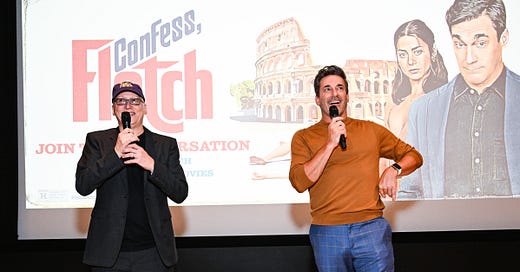Watch ”Confess, Fletch” and Help Save the Disappearing Non-Blockbuster Movie
Jon Hamm resurrected the comedy/mystery franchise (and did a great job of it!) but almost no one knows about the film.

I come to sing the praises of a movie that’s a solid A- or B+.
It is not high art. It will almost certainly not be considered for an Oscar or any major award. But it’s a very good movie that made me legitimately laugh and pleasantly entertained me for an hour and a half. Other people seem to like it a lot, too (it’s rated over 86% “fresh” on Rotten Tomatoes).
You could make the argument, however controversial, that it’s the most important movie of the moment.
I’m talking about Confess, Fletch, of course.
What, you hadn’t heard that they rebooted the Fletch franchise? The one that produced one of Chevy Chase’s few actually-good movies, Fletch, in 1985 (and also one of Chevy’s very bad movies, Fletch Lives, in 1989)? The one that was born of Gregory McDonald’s popular pulp comic-mystery series of books about a wiseass L.A.-based investigative reporter who charms and sleuths and annoys—and is sometimes quite clever, while also being kind of an idiot?
Well, shit, they did! And it’s good!
The project spent three decades in development hell. In the early 2000s, Kevin Smith was going to helm a whole series of films with Jason Lee as the titular Fletch. Later, Jason Sudekis was going to run the franchise.
Finally, Jon Hamm—Don Draper himself—took the reins as star and producer. He brought on Greg Mottola—director of numerous great, non-blockbuster movies that people love and yet no one makes anymore (Superbad, Adventureland, The Daytrippers)—to run the production.
Smart, funny, and not too self-serious are rare combos in modern pop movie culture. (Even Marvel movies, except for maybe the Guardians of the Galaxy series, take themselves so seriously.)
But these kind of movies used to be a staple of our pop culture diets.
These were the kind of movies that solved arguments at the video store. The kind of movies that when they came on HBO, you’d watch until the end (no matter where in the film you started). You’d even go to these movies on date nights.
People liked them! They made money! And yet, they’re all but obsolete.
The reasons for the collapse of the non-blockbuster/non-Oscar bait movie are more complicated (and more cynical) than the collapse of something like…local journalism.
The latter was obliterated by the rise of sites like Craigslist serving as a free platform for classified ads. Those ads, far more than a print ad for the local supermarket, were what kept local papers going. But we’re nearly three decades into a ubiquitous world wide web and nothing has emerged that could replace that classified ad revenue. The public is also still defiantly hostile to paying for news (something they never thought twice about doing before the internet.)
The demise of the mid-budget movie—one that can appeal to people over the age of 17—has more to do with Hollywood’s discovery that the path to sustained financial growth lies not in financing a dozen movies built on original material and hoping that two or three of them become hits. Rather, the safest, most profitable strategy is to take something that worked before, and repeat it relentlessly, forever.
When the early 2000s iteration of X-Men movies earned both critical acclaim and did boffo box office numbers, the corporations that own the major studios realized that pre-existing intellectual property (comic book franchises, Star Wars, hit movies from previous decades) represented a much less-risky proposition than taking any chances on artistic expression.
Over two decades later, Marvel movies almost always turn a profit. Batman and Spider-man will be rebooted every six years until morale improves. Older, mostly forgotten TV shows and movies get updated (21 Jump Street, White Men Can’t Jump) into new content with mixed results.
Gen X is the current middle-aged demographic with the money, and their nostalgia for 80s and 90s content is primed to be exploited (ironic, given Gen X’s supposed cynicism and lack of sentimentality).
The Fletch franchise checks some of these boxes (movies from the 80s, books originating in the 70s). But the “Fletch” character has been gone from the pop culture forefront for so long that he’s practically a new discovery.

Mottola told an Uproxx interviewer: “...we looked for partners on the movie, and everyone passed. Everyone said, ‘I don’t know that this kind of comedy works in this day and age.’ They just had a kind of like, ‘Who’s Fletch? I don’t think anyone cares anymore.’”
The director described Confess, Fletch as the type of movie that, once upon a time, “When the blockbuster was sold out, you’d go to another screen at the multiplex and see this and go, ‘Oh, I’m glad I saw that.’”
But they still could barely get financing. Indeed, Hamm gave back 60 percent of his salary so the production could eke out a 30-day shoot.
And even though critics liked the film, the studio unceremoniously dumped it on Showtime and gave it almost no promotion. (I’m fairly in-tuned with the movie world, but I didn’t know the film existed until I saw it listed among the available entertainment on a Jetblue flight.)
I have no idea how streaming platforms monetize stuff like Confess, Fletch. And trying to “save” this kind of movie might prove foolhardy. Maybe, like rock and roll, its era has simply passed and it’s now just a niche genre.
All I can say is if you’re a fan of “movies”—differentiated from prestige films and special effects-laden spectacles—please pay money to stream Confess, Fletch.
Think of it as a protest purchase, or your good deed for the day—and enjoy the “movie-movie.”





I couldn't agree more, Anthony. I watched this last fall with my wife and it was a "good" movie. Light and entertaining. Eminently rewatchable.